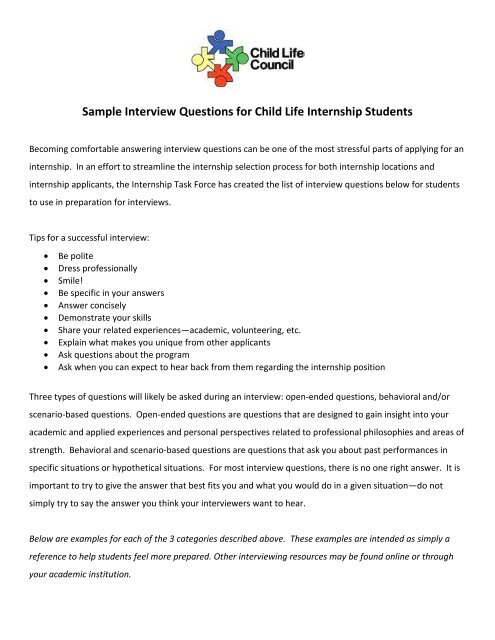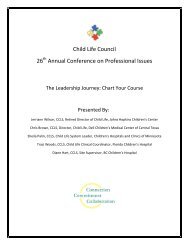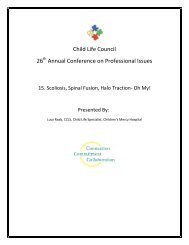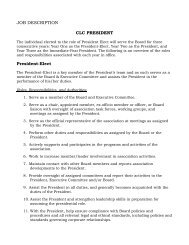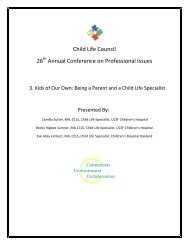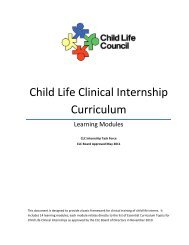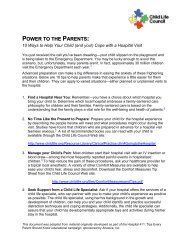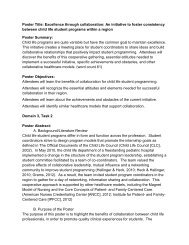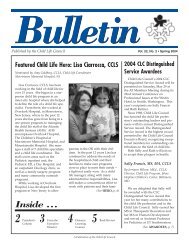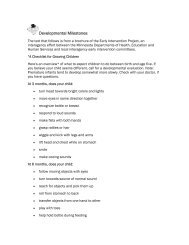Interview Questions For Internship Students - Child Life Council
Interview Questions For Internship Students - Child Life Council
Interview Questions For Internship Students - Child Life Council
Create successful ePaper yourself
Turn your PDF publications into a flip-book with our unique Google optimized e-Paper software.
Sample <strong>Interview</strong> <strong>Questions</strong> for <strong>Child</strong> <strong>Life</strong> <strong>Internship</strong> <strong>Students</strong>Becoming comfortable answering interview questions can be one of the most stressful parts of applying for aninternship. In an effort to streamline the internship selection process for both internship locations andinternship applicants, the <strong>Internship</strong> Task <strong>For</strong>ce has created the list of interview questions below for studentsto use in preparation for interviews.Tips for a successful interview:• Be polite• Dress professionally• Smile!• Be specific in your answers• Answer concisely• Demonstrate your skills• Share your related experiences—academic, volunteering, etc.• Explain what makes you unique from other applicants• Ask questions about the program• Ask when you can expect to hear back from them regarding the internship positionThree types of questions will likely be asked during an interview: open-ended questions, behavioral and/orscenario-based questions. Open-ended questions are questions that are designed to gain insight into youracademic and applied experiences and personal perspectives related to professional philosophies and areas ofstrength. Behavioral and scenario-based questions are questions that ask you about past performances inspecific situations or hypothetical situations. <strong>For</strong> most interview questions, there is no one right answer. It isimportant to try to give the answer that best fits you and what you would do in a given situation—do notsimply try to say the answer you think your interviewers want to hear.Below are examples for each of the 3 categories described above. These examples are intended as simply areference to help students feel more prepared. Other interviewing resources may be found online or throughyour academic institution.
Examples of Open-Ended <strong>Questions</strong>:• There are many careers involving service to and advocacy for children and families. Why have youchosen to pursue child life?• What qualities and skills do you possess that will help you during your internship and later as aspecialist?• Please describe a specific experience you’ve had with a hospitalized child or family that was significantfor you?Examples of Behavioral <strong>Questions</strong>:• Tell us about a time when you may have had a difficult time maintaining a professional (versuspersonal) relationship with a child or family.• Feedback is an important part of the learning process. Give an example of a time in which youreceived constructive feedback and tell what you did with the information?• Describe a time when you had to advocate for a child.Examples of Scenario-Based <strong>Questions</strong>:• As an intern, you are just meeting a patient and their family for the first time. They are unfamiliar withchild life. Please introduce yourself and your role.• Using what you know about child development, identify what will cause stress for the patient or familyin the following situations.o A 6-month-old child is having an IV start for the first time. Parents are present and very anxiousand worried about how the child will respond.o An 8-year-old child is having an IV start. The previous IV start took multiple sticks. The child’sparents had to go to work and the child will be alone for the procedure.• You are conducting an activity in a crowded playroom. In the corner, there are two parents having ananimated conversation. As time passes, their voices increase in volume and you begin to hear foullanguage being used. What do you do?


